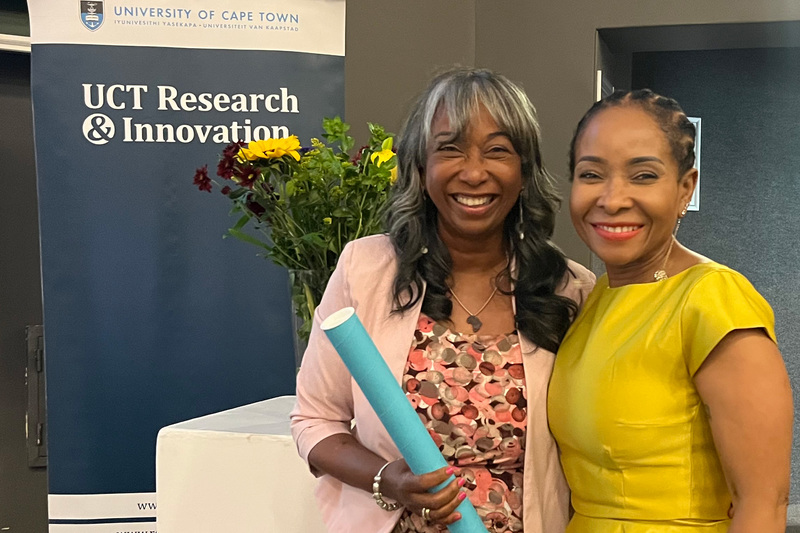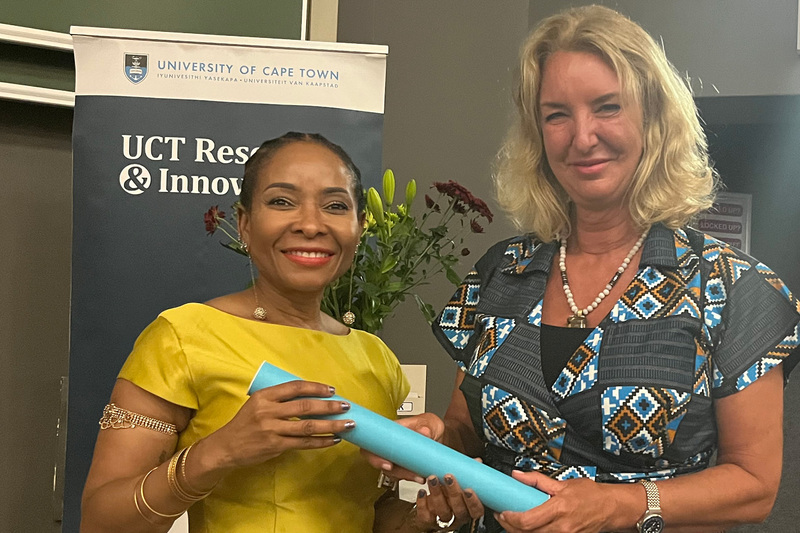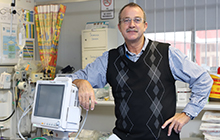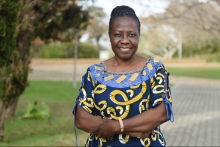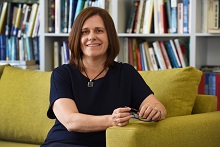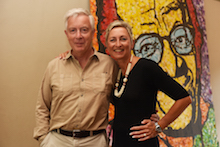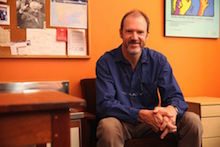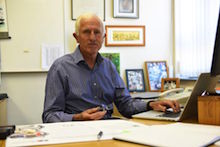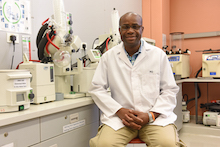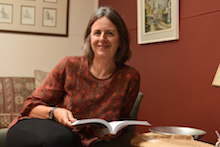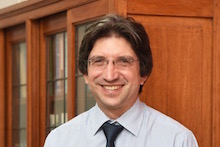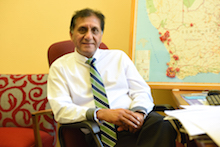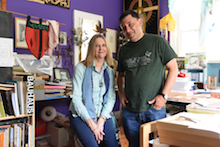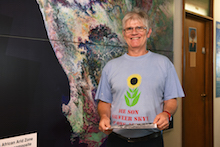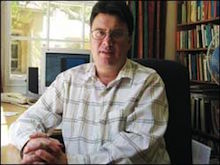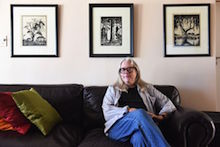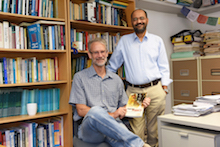The UCT Alan Pifer Research Award is the Vice-Chancellor’s annual prize in recognition of outstanding research that has demonstrable impact on society. This award highlights UCT's strategic goal of promoting socially responsive research, and honours one or more top researchers at UCT who are engaged in medical, economic, scientific, engineering and social research, and whose outreach work has contributed to the advancement and welfare of South Africa’s disadvantaged people.
The main criteria for evaluation are excellence (as demonstrated through a combination of measurable indicators); impact (as demonstrated through ways in which the research has changed - or will change - society for the better); innovation (as demonstrated by the novelty of the approach and / or research methodology); and reach (as demonstrated by the extent or scope of the portion of society that will benefit from the research). Visit the Research Support Hub for more information on the awards and nominations process.
About Alan Pifer
The prize was established to honour Alan Pifer, a philanthropist and the former president of the Carnegie Corporation. A long-term UCT benefactor, he passed away in 2005.
Throughout Pifer’s career, his focus was on social justice and strengthening the rights of historically disadvantaged groups, including women. Pifer also established the UCT Fund, which raises funds in the United States to support black students and to promote the advancement and welfare of disadvantaged groups.
2023
The 2023 Alan Pifer award was made to Professor Keertan Dheda, the Head of the Division of Pulmonology, for leading tuberculosis (TB) research. While rooted in academic excellence and scientific innovation, his work stands out for its profound societal impact.
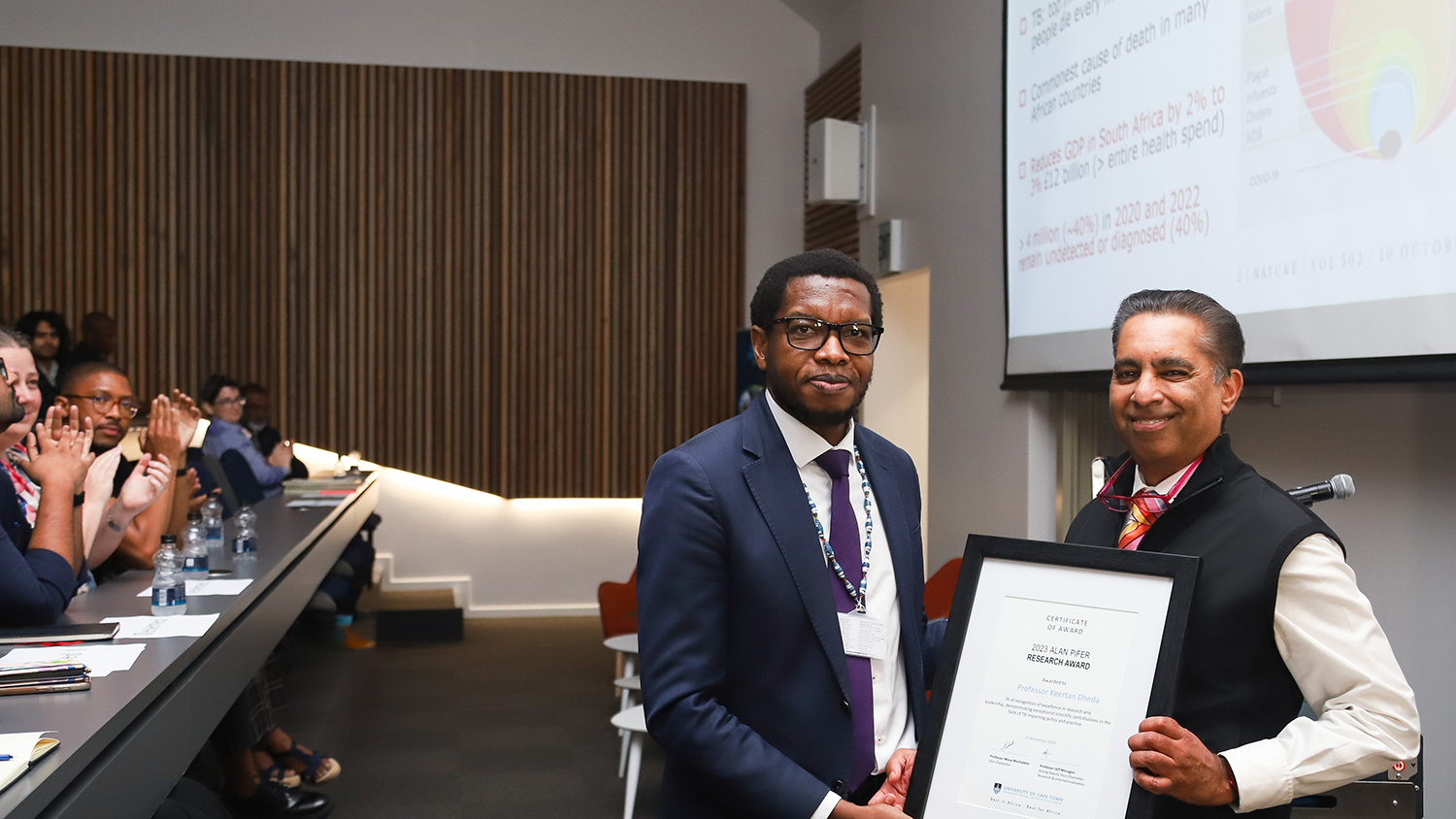
Professor Keertan Dheda
Division of Pulmonology
Read more: Leading in TB research earns Prof Keertan Dheda the 2023 Alan Pifer Award
2022
The 2022 Alan Pifer award was made to Professor Shanaaz Mathews, for her efforts to combine academic excellence with dogged determination and a deep-rooted commitment to social justice.
Professor Shanaaz Mathews
Department of Paediatrics and Child Health
Read more: ‘Accidental academic’ Prof Shanaaz Mathews wins 2022 Alan Pifer Award
2021
The 2021 Alan Pifer award was made to Professors Liesl Zühlke and Karen Sliwa-Hahnle.
Professor Liesl Zühlke
Division of Paediatric Cardiology; Children’s Heart Disease Research Unit
2021 Alan Pifer Award recipient Prof Liesl Zühlke not only has a resume that exemplifies academic excellence, but also a deep commitment to seeing child and women’s health take its rightful place at the centre of the global health agenda.
Read more: Alan Pifer winner champions child and women’s heart health
Professor Karen Sliwa-Hahnle
Cape Heart Institute
2021 Alan Pifer Award recipient Prof Karen Sliwa-Hahnle who is renowned for her career-long dedication to addressing heart-health challenges common in Africa, especially amongst pregnant women. She has a legacy of research excellence, impact and innovation.
Read more: Heart disease doyen wins Alan Pifer Award
2020
The 2020 Alan Pifer award was made to Professors Cathy Ward and Ambroise Wonkam.
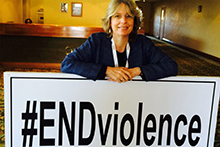
Professor Catherine Ward
Department of Psychology
Prof Cathy Ward was awarded the 2020 Alan Pifer Award in recognition of her exceptional dedication to violence prevention. As one of the founders of Parenting for Lifelong Health, a suite of programmes dealing with conflict in the home, Ward has profoundly impacted the prevention of violence against children across South African society.
Read more: Prestigious Alan Pifer Award for Professor Cathy Ward

Professor Ambroise Wonkam
Director of Genetic Medicine of African Populations (GeneMAP)
Prof Ambroise Wonkam was awarded the 2020 Alan Pifer Award in recognition of his work in describing novel variant genes relevant for congenital hearing impairment in populations of African ancestry, in South Africa and various countries across the continent. As well as his discovery of a set of gene variants which are key for long-term survival in Sickle Cell Disease in Africa. He has also introduced prenatal genetic diagnosis for SCD in both Cameroon and Cape Town, and so increasing reproductive options for at-risk parents.
Read more: Alan Pifer Award: A hat-tip to geneticist Professor Ambroise Wonkam
2019
Professor Elmi Muller
Division of General Surgery
Professor Elmi Muller has won the 2019 Alan Pifer Research Award. The award recognises her dedication to making organ transplantation available to vulnerable people. Muller is recognised as a global authority on kidney and liver transplantation and a trailblazer in the field of organ transplantation in HIV-positive patients.
Read more: Professor Elmi Muller wins the 2019 Alan Pifer Award
2018
Professor Sebastian van As
Head of the Red Cross Children’s Hospital Trauma Unit
Professor Sebastian van As has won the 2018 Alan Pifer Research Award. The award recognises the important research Professor van As has conducted over the past 20 years into child safety in South Africa. Van As has made it his life’s work to treat and prevent childhood injury. In 2000, he joined the Red Cross Children’s Hospital Trauma Unit, and in 2007, he was elected chair of ChildSafe South Africa, a national child safety NGO working to make the country a safer place for all its children.
Read more: Professor Sebastian van As awarded 2018 Alan Pifer Award
2017
Professor Heather Zar
Division of Paediatric Medicine, Faculty of Health Sciences
UCT’s Professor Heather Zar has been named recipient of the 2017 Alan Pifer Award – a prestigious prize presented annually by UCT’s vice-chancellor in recognition of outstanding socially responsive research. Zar, a paediatrician and scientist, has gained a reputation for rising above the challenges posed by a lack of resources to create new strategies to address key childhood illnesses. Over the past 20 years, she has helped improve and save the lives of thousands of children through research and innovation in child health.
Read more: Heather Zar: improving and saving lives
2016
Professor Chuma Himonga
Department of Private Law, Faculty of Law
Professor Chuma Himonga, in the Department of Private Law in UCT’s Faculty of Law, won the 2016 Alan Pifer Award for her many contributions to reconciling traditional regulatory frameworks and common law. Himonga has been part of a group of legal academics who have been influential in seeking ways of defining and ascertaining customary law for purposes of its application, and reconciling this system of law with human rights, including constitutional rights in South Africa.
Read more: The sun never caught Chuma Himonga sleeping
2015
Professor Ingrid Woolard
Dean of Faculty of Commerce
Professor Ingrid Woolard, professor in the School of Economics and former Dean of Commerce, won the 2015 Alan Pifer Award for her notable contributions to the analysis of poverty and inequality, and unemployment in South Africa, and the way she used her data to undertake a number of highly influential research papers to carry her work through to official policy work.
Read more: Balance and blend - the new dean of commerce
2014
Professors Robin Wood and Linda-Gail Bekker
Institute of Infectious Disease and Molecular Medicine (IDM), Faculty of Health Sciences
Professors Robin Wood and Linda-Gail Bekker, director and deputy-director of the Desmond Tutu HIV Foundation, won the 2014 Alan Pifer Award for excellence in research, treatment, training and prevention of HIV-related diseases and infections in Southern Africa.
Read more: Two researchers' journey from AIDS despair to an age of hope
2013
Professor Crick Lund
Department of Psychiatry and Mental Health, Faculty of Health Sciences
Professor Crick Lund, director of the Alan J Flisher Centre for Mental Health, was awarded for his work in addressing the treatment gap for people with mental illness in low- and middle-income countries.
Read more: Lund scoops Alan Pifer Award
2012
Emeritus Professor Eric Bateman
Department of Medicine, Faculty of Health Sciences
Professor Eric Bateman is a world-leading pulmonologist whose most important work has tackled the challenges of respiratory diseases such as asthma, chronic obstructive pulmonary disease and tuberculosis. He founded the UCT Lung Institute in 2000, which has since become an international beacon of innovative research.
Read more: Bateman wins 2012 Alan Pifer Award
2011
Professor Kelly Chibale
Department of Chemistry, Faculty of Science
Under the leadership of Professor Kelly Chibale, the Drug Discovery and Development Centre (H3-D) strives to train a new generation of African scientists with the skills required to combat Africa’s high burden of disease. The goal is to bridge the gap between basic research and clinical studies and ensure the pipeline of drug discovery and development remains on the continent.
Read more: Chibale bags the Alan Pifer Award
2010
Professor Sue Parnell
Department of Environmental and Geographical Science, Faculty of Science
According to Professor Sue Parnell, Department of Environmental and Geographical Sciences and executive committee member of the African Centre for Cities, a city can be governed to promote inclusion and provide for the urban poor, but this requires careful planning and understanding of how resources are managed and used.
Read more: Prestigious Pifer for Parnell
2009
Professor Dan Stein
Department of Psychiatry and Mental Health, Faculty of Health Sciences
Psychiatric disorders account for the 3rd largest portion of South Africa’s disease burden. Yet mental disorders remain the most stigmatised and grossly neglected of medical conditions. Professor Dan Stein, head of the Department of Psychiatry and Mental Health, has dedicated more than 20 years of his life to the study of mental illness, with work ranging from clinical neuroscience to public mental health.
Read more: Stein wins prestigious Pifer Award
2008
Professor Raj Ramesar
Department of Pathology, Faculty of Health Sciences
Professor Raj Ramesar, head of the Division of Human Genetics and director of the Human Genetics Research Unit, discovered a common genetic mutation linked to colorectal cancer in some of the most neglected communities in the Northern Cape of South Africa. In response he developed an intervention programme which successfully lowered mortality and morbidity in those communities.
Read more: Remesar dedicates award to team
2007
Professors Pippa Skotnes and Mark Fleishman
Michaelis School of Fine Art and Department of Drama, Faculty of Humanities
Every year in the small Western Cape town of Clanwilliam, local schoolchildren take part in workshops hosted by UCT’s arts and drama departments, which culminate in the annual Spring Festival. The children use their new arts and drama skills to tell the stories of San hunter-gatherers, the oldest inhabitants of southern Africa. Professor Pippa Skotnes, director of the Centre for Curating the Archive and Mark Fleishman, programme convener for theatre and performance in the Department of Drama won the award for their role in developing this annual event.
Read more: Clanwilliam project nets second Pifer Award
2006
Professor Timm Hoffman
Department of Biological Sciences, Faculty of Science
Professor Timm Hoffman, Leslie Hill Chair of Plant Conservation, Department of Biological Sciences, won the Alan Pifer Award for his work on the use of natural resources in the communal areas of South Africa; the impact of land degradation on people’s lives and his continued efforts to ensure his research contains an active and relevant rural development component.
Read more: Timm Hoffman: changes in land use
2005
Professor Alan Flisher
Department of Psychiatry and Mental Health, Faculty of Health Sciences
It was for his work on the epidemiology of high-risk behaviour among adolescents, particularly related to sexual behaviour and substance abuse, and on public mental health in the South African context, that the late Professor Alan Flisher, former Sue Struengmann Professor of Child and Adolescent Psychiatry and Mental Health, received this award.
Read more: Work on marginalised group
2004
Professor David Chidester
Department of Religious Studies, Faculty of Humanities
Professor David Chidester, Chair of Religious Studies, is an international figure in the field of comparative religion. He made an important contribution to the development of policy in the crucial area of religion and education, designed to increase tolerance and protect learners from discrimination on the basis of their religion.
Read more: Pifer award salutes scholar
2003
Professors Murray Leibbrandt and Haroon Bhorat
School of Economics, Faculty of Commerce
Professors Murray Leibbrandt and Haroon Bhorat were awarded the Alan Pifer for their work conducting international quality analysis of survey data to better understand the relationship between the labour market and the reproduction of poverty and inequality in South Africa.
Read more: Second economics duo wins Pifer Award
2001
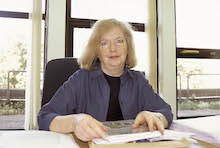
Emeritus Professor Sandra Burman
Centre for Socio-Legal Research
The late Professor Sandra Burman, former director of the Centre for Socio-Legal Research, dedicated much of her life’s work to bridging the divide between the rights children enjoy according to legislation and the systems charged with ensuring their implementation.
2000
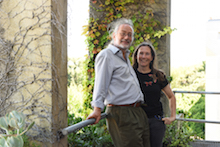
Professors Nicoli Nattrass and Jeremy Seekings
School of Economics and Department of Sociology, Faculty of Commerce and Faculty of Humanities
South Africa has always been a country of insiders and outsiders, and today one of the biggest fault lines in society is between the employed and the unemployed. For Nicoli Nattrass, professor of economics in the Centre for Social Science Research (CSSR) and her husband, Jeremy Seekings, professor of political studies and sociology and director of the CSSR, the burning question remains: how does government policy shape this divide, and who "wins" and who "loses" in South Africa.
1999
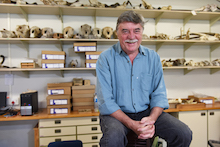
Emeritus Professor John Parkington
Department of Archaeology, Faculty of Science
In the mid-1990s John Parkington, emeritus professor in the Department of Archaeology, launched the Living Landscapes project which entrenched the remarkable archaeological work going on in the small Western Cape town of Clanwilliam into the local community. The Living Landscapes project aims to raise awareness of the history of the region and boost the economy and employment levels.
1998
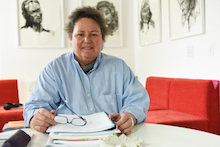
Professor Lynnette Denny
Department of Obstetrics and Gynaecology, Faculty of Health Sciences
Cervical cancer is the most common cancer among women in developing countries, yet it is a largely preventable disease. Lynnette Denny, head of the Department of Obstetrics and Gynaecology, won the Alan Pifer Award for her work in developing a low-cost medical procedure to screen for cervical cancer.
1997
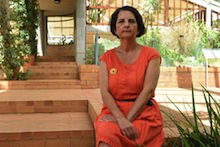
Dr Farieda Kahn
Department of Environmental and Geographical Science, Faculty of Science
In developing countries such as South Africa, access to environmental advice and scientific expertise tends to be a luxury of the rich. The irony of this is that those groups most dependent on, and at risk from, their environments are often the most disadvantaged in a society. Under the leadership of Farieda Kahn, the Environmental Advisory Unit in the Department of Environmental and Geographical Science provided environmental advice to poor communities.
1996
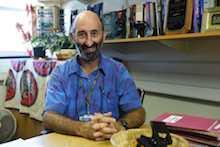
Professor Leslie London
Department of Public Health and Family Medicine, Faculty of Health Sciences
South African farmworkers remain one of the country’s most vulnerable groups. One serious risk faced by farmworkers is exposure to pesticides. Leslie London, head of the Division of Public Health Medicine, was awarded the Alan Pifer Award for his research into farmworkers’ exposure to hazardous pesticides – work that resulted in improved health and safety measures for the group.
1994

Professor George Ekama
Department of Civil Engineering, Faculty of Engineering and Built Environment
South Africa is running out of water. A recent Department of Water and Sanitation report revealed that demand for water has overtaken supply in 60% of the country’s water management systems. George Ekama, professor in the Department of Civil Engineering, has focused his career on finding solutions to South Africa’s wastewater problem.
1993
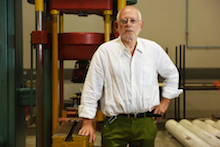
Emeritus Professor Jonathan Myers
Department of Public Health and Family Medicine, Faculty of Health Sciences
Workplace exposure to substances that are hazardous to human health has ruined the lives of thousands of vulnerable workers. It is in part thanks to the important work done by Jonny Myers, former director of the Occupational and Environmental Health Unit, that organised workers were able to push for better health and safety at work.
